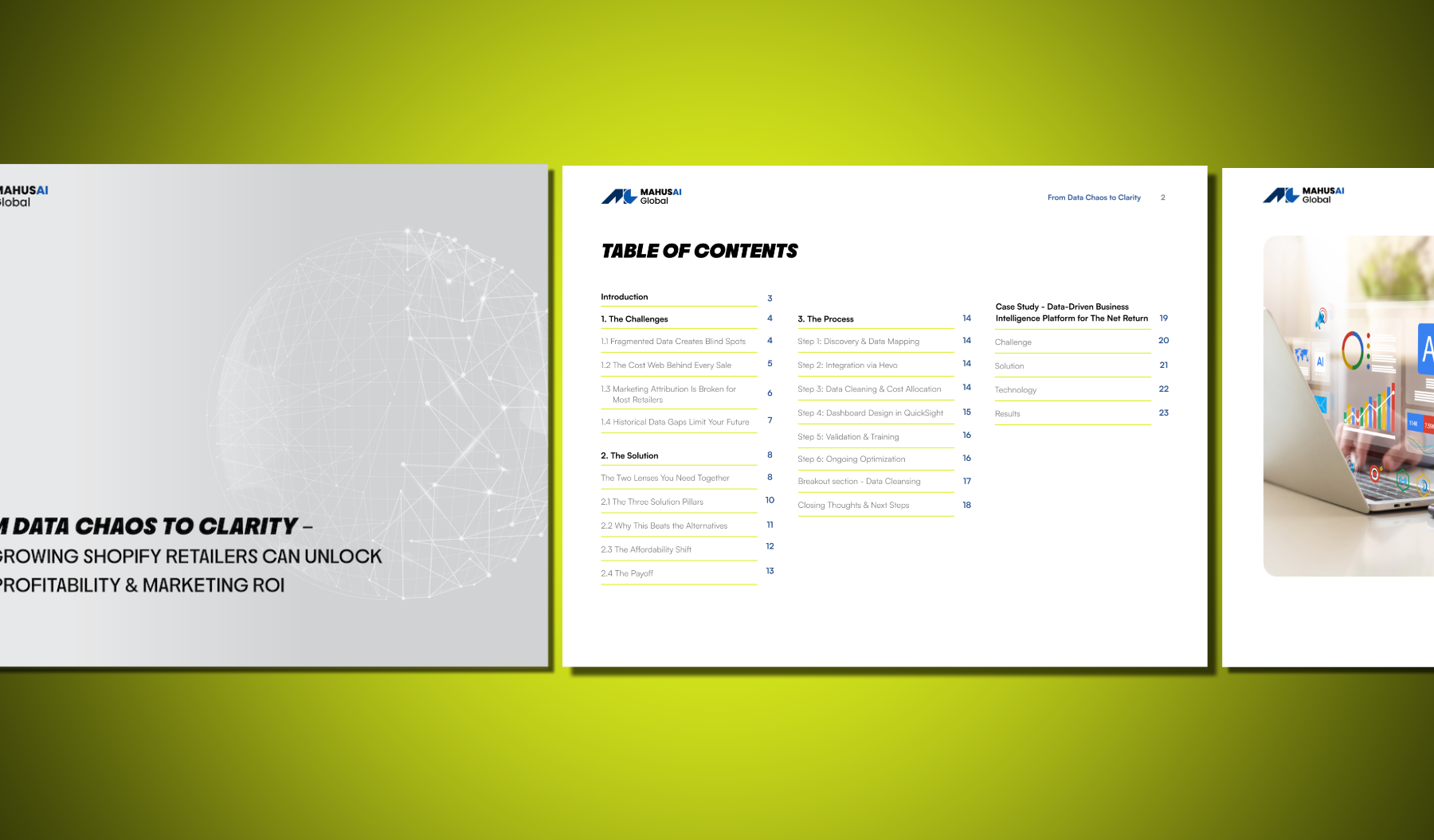When a private equity firm acquires a portfolio company, the pressure to demonstrate value creation begins immediately. Investors expect results in the first 12 months, and management needs early wins to prove the deal thesis. One of the fastest levers for value creation? The right IT projects.
Based on industry research and Mahusai Global Partners’ experience, here are the top initiatives that deliver measurable EBITDA impact within the first year post-acquisition—tailored to both general mid-market companies and industrial products & services portfolio companies.
1. Establish a Strong Data Foundation
A recurring issue in portfolio companies is fragmented systems and unreliable reporting. Finance spends weeks closing the books, executives debate “whose numbers are right,” and operational decisions are often made on gut feel.
The fix is clear: build a centralized data foundation. This means unifying ERP, CRM, and financial systems into a single source of truth with strong governance. Research shows companies that implement enterprise data and BI platforms see 20–40% EBITDA improvements within 12–18 months.
MGP helps companies stand up cloud data warehouses (AWS Redshift, Snowflake), integrate systems, and deliver dashboards in as little as 6–12 weeks. This creates real-time visibility on revenue, margins, and operational KPIs—an essential first step for every PE-backed company.
2. Deploy Business Intelligence & Analytics for Fast Visibility
With clean data in place, the next lever is to turn data into insight. Research highlights BI platforms as the highest-ROI technology investment for PE firms, enabling real-time KPI tracking, predictive analytics, and automated investor reporting.
For industrial portfolio companies, advanced analytics platforms go even further—optimizing production efficiency (15–25%), improving energy management (10–20%), and reducing quality issues before they occur.
MGP’s Data Science & BI practice delivers interactive dashboards, predictive forecasting, and AI copilots that empower executives to move from reactive management to proactive, data-driven decisions.
3. Unify and Modernize CRM Systems
Many acquired businesses have fragmented CRMs—or none at all. Research shows CRM consolidation delivers results within 90 days, with sales velocity improving by 30–50% and cross-sell opportunities worth 15–25% of existing revenue.
MGP goes beyond system setup by aligning CRM data with marketing automation and analytics. We also deploy AI-assisted sales enablement, from lead scoring models to proposal-writing copilots, accelerating revenue capture without adding headcount.
4. Deploy Automation & AI Agents to Reduce Costs
Robotic Process Automation (RPA) has been shown to cut manual work by over 150,000 hours annually in PE-backed companies. Research examples include reducing a 6-hour manual process to just 10 minutes.
For industrial companies, AI-enabled predictive maintenance is one of the highest-value automation plays. It reduces unplanned downtime by 35–45%, cuts maintenance costs by 10–40%, and extends equipment life by up to 40%.
MGP extends these gains with AI Agents and Co-Pilots—digital teammates that automate reporting, compliance, or customer service while also supporting digital twin simulations for industrial operators.
5. Optimize Digital Commerce & Customer Platforms
For consumer and retail portfolio companies, the e-commerce channel is often under-optimized. Research shows digital commerce initiatives deliver 20–40% revenue growth by expanding reach and improving customer engagement.
MGP’s e-Commerce Analytics & Data Warehousing solution unifies Shopify, Financial Accounting, CRM, and ad platforms into a single data warehouse. Our dashboards don’t stop at gross margin—they calculate Net Contribution Margin by allocating shipping, fees, refunds, and ad costs at the order level. This gives operators a clear view of true profitability across products, customers, and channels.
6. Industrial-Specific Digital Transformation Levers
For portfolio companies in industrial products and services, certain IT investments create extraordinary value. Unlike consumer businesses, where the focus is on marketing and digital sales, industrial transformations center on operations, asset reliability, and compliance.
Manufacturing Execution Systems (MES)
MES provides the digital backbone of factory operations, integrating ERP, supply chain, and shop floor systems.
- Boosts production efficiency and reduces downtime.
- Real-time quality control can cut scrap and rework by 30–50%.
- Optimizes working capital with 20–30% inventory reduction.
- Automates compliance documentation, reducing audit prep time.
Industrial IoT & Smart Manufacturing
IoT sensors and AI-powered analytics unlock real-time operational visibility.
- 30% labor productivity improvements and 10–20% energy savings are common.
- Automotive component manufacturers cut defects by 37% while expanding capacity by 30% without new floor space.
- Scales quickly across roll-up strategies—ideal for PE platforms.
Quality Management Systems (QMS)
In regulated industries, compliance equals survival. Electronic QMS platforms digitize audits and workflows.
- Reduce compliance costs by 25–35%.
- Prevent quality failures, lowering defect costs by 20–30%.
- Automate documentation, cutting manual effort by 40–60%.
- Integrate directly with MES and ERP to create closed-loop quality control.
Digital Twins
Virtual replicas of assets, lines, or entire factories, fed by IoT data, deliver transformative ROI.
- Enable predictive maintenance and reduce downtime.
- Improve energy efficiency through optimized load balancing.
- Eliminate costly prototypes, speeding time-to-market.
- Deliver 2–4% net income margin improvement for large operations.
- Recent M&A shows digital twin companies commanding 10.5x–14.4x revenue multiples—a lever for multiple expansion, not just operations.
Why this matters for PE firms: Industrial digital transformation projects don’t just reduce costs—they unlock capacity, lower risk, and drive premium exit valuations. Research shows PE-backed industrials executing digital transformation see 25–40% higher exit multiples compared to peers.
7. Launch New Digital Ventures
Finally, IT should not just optimize operations—it can also create new revenue streams leveraging existing assets. Through MGP Venture Studios, we help PE-backed companies build SaaS platforms, mobile apps, and AI-powered services in as little as 6–12 weeks.
For industrial companies, this could mean launching IoT-enabled aftermarket services, predictive maintenance platforms, or subscription-based analytics offerings that layer new, high-margin revenue streams on top of traditional lines of business.
The Bottom Line for PE Firms
Technology isn’t just back-office plumbing anymore—it’s a strategic value lever. The right IT projects in the first year can increase EBITDA by double digits, accelerate growth, and improve exit multiples.
At Mahusai Global Partners, we help PE-backed companies focus on high-ROI projects that deliver results fast: strong data foundations, actionable analytics, CRM enablement, predictive maintenance, MES, IoT, and new digital ventures. These aren’t IT experiments—they’re proven value creation levers.




